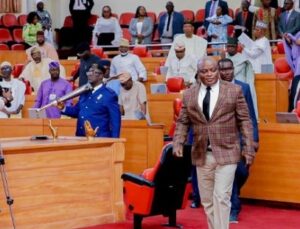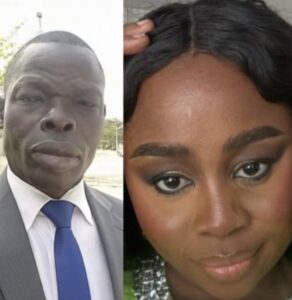The Scandals and Controversies That Led to the Fall of Former Lagos Speaker Obasa
The Scandals and Controversies That Led to the Fall of Former Lagos Speaker Obasa

Obasa held the position of Speaker from 1999 to 2007, overseeing many significant decisions during his tenure. However, his political downfall was attributed to a combination of actions that angered key stakeholders, including state officials and party leaders.
One of the pivotal moments came when Obasa reportedly informed President Tinubu about Obasa’s disrespectful behavior toward Governor Sanwo-Olu, detailing various incidents. The backlash was swift, with Tinubu publicly rebuking Obasa for undermining not only the governor but also the party leadership and the Governor’s Advisory Council (GAC). Following this, political adversaries of Obasa regrouped, and the very colleagues who once helped him achieve a record-setting tenure in the state House ultimately turned against him, leading to the end of his political career.
Here are some key controversies involving the former speaker, who began his political journey as a councillor in Agege Local Government.
Proposal to Abolish LCDAs
Under Obasa’s leadership, the Lagos State House of Assembly introduced a bill aimed at scrapping the 37 Local Council Development Areas (LCDAs) created during Tinubu’s tenure. This bill sought to replace the LCDAs with new administrative areas, aligning with the constitutional recognition of 20 local government areas (LGAs). The proposal drew strong criticism, with the Lagos APC Chairman, Sunday Ojelabi, defending the LCDAs. Ojelabi highlighted the crucial role the LCDAs had played in driving infrastructural development, including the construction of roads, schools, and health facilities, as well as their contributions to maintaining public services like waste management and security.
Dispute Over Commissioner Confirmations
Another major conflict arose in 2023 when Obasa’s House rejected 17 of the 39 commissioner nominees proposed by Governor Sanwo-Olu. Among those rejected were six members who had previously served in the governor’s first-term cabinet. This action led to national media attention and prompted the GAC to intervene, trying to broker peace between the two parties. Obasa defended the legislature’s right to approve or reject nominees, insisting there was no rift with the governor, though many interpreted his statement as defiant, particularly given his rising political ambitions.
Allegations of Financial Mismanagement
In 2020, SaharaReporters uncovered multiple bank accounts linked to Obasa’s Bank Verification Number (BVN), which allegedly were used to divert public funds. Investigations revealed that the former speaker held accounts in several banks under different names, including those of companies connected to him. The report claimed Obasa used these accounts to conceal illicit transactions, leading to accusations of corruption. Although the EFCC questioned him regarding these allegations, Obasa denied any wrongdoing, attributing the accusations to his political rivals.
The N17 Billion Gate Scandal
Perhaps one of the most talked-about controversies was the alleged allocation of N17 billion for the construction of a gate, which a group called the Lagos State Anti-Corruption Coalition accused Obasa’s administration of overseeing. The group filed a petition with the EFCC, demanding an investigation. Obasa dismissed the claim, pointing out that such an expenditure was unrealistic given the Assembly’s budget. He attributed the allegations to political maneuvering ahead of the 2027 elections, a claim he described as both baseless and politically motivated.
These incidents collectively tarnished Obasa’s political image and marked the decline of his once-prominent career in Lagos state politics.
TRENDING SONGS
 RCCG PASTOR ANGRY OVER CALLING Him“MR” INSTEAD OF “DR,” DECLARES CURSE ONLINE
RCCG PASTOR ANGRY OVER CALLING Him“MR” INSTEAD OF “DR,” DECLARES CURSE ONLINE
 NPMA Appeals to Nigerian Government for Compensation After Lagos Market Fire
NPMA Appeals to Nigerian Government for Compensation After Lagos Market Fire
 Rest Every Four Hours, FRSC Issues Safety Guide for Fasting Motorists
Rest Every Four Hours, FRSC Issues Safety Guide for Fasting Motorists
 NNPC Boss Ojulari Bags UK Energy Institute Fellowship
NNPC Boss Ojulari Bags UK Energy Institute Fellowship
 Shock in Anambra: Bride Disappears Moments Before Wedding
Shock in Anambra: Bride Disappears Moments Before Wedding
 Nigerian Woman Returns ₦330 Million Accidentally Credited to Her Account
Nigerian Woman Returns ₦330 Million Accidentally Credited to Her Account
 APC Don Reach Morocco?’ VeryDarkMan Reacts to Seyi Tinubu Poster
APC Don Reach Morocco?’ VeryDarkMan Reacts to Seyi Tinubu Poster
 Bride Breaks Down in Tears as Wedding Meals Were Kept Secretly While Guests Go Home Hungry
Bride Breaks Down in Tears as Wedding Meals Were Kept Secretly While Guests Go Home Hungry
 Odogwu by Day, Robber by Night: How Marriage Joy Turned Into Tragedy
Odogwu by Day, Robber by Night: How Marriage Joy Turned Into Tragedy
 Nigerian Officials Allegedly Pocket N4–6B Weekly Through Smuggling Cartels at Seme–Badagry Border
Nigerian Officials Allegedly Pocket N4–6B Weekly Through Smuggling Cartels at Seme–Badagry Border
Share this post with your friends on ![]()













